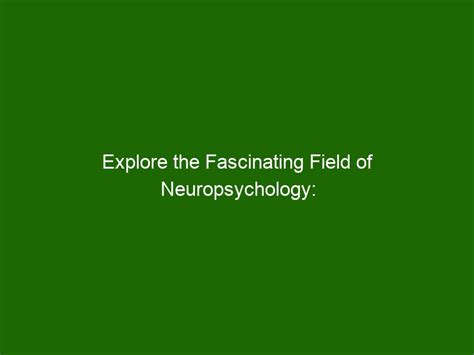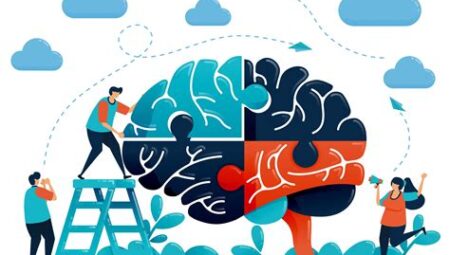Are you fascinated by the complex workings of the human brain? Do you wonder how our brain functions influence our behavior and mental well-being? If so, then you’re in for a treat with our latest blog post on the fascinating field of neuropsychology. In this post, we’ll be unraveling the intricate mysteries of the brain, exploring its anatomy, functions, and the role of neurons in brain function. We’ll also delve into how neuropsychology aids in diagnosing and treating various brain disorders, and its impact on mental health. Furthermore, we’ll investigate the relationship between brain and behavior, the complexities of memory and learning, and how advancements in neuropsychological research and technology are shaping the future of this field. Join us as we embark on a journey into the exciting world of neuropsychology, from understanding its basics to exploring the potential of brain-computer interfaces.
Table of Contents
Understanding the Basics of Neuropsychology
Neuropsychology is the study of the relationship between the brain and behavior, focusing on how brain function influences cognitive, emotional, and behavioral processes. It is a multidisciplinary field that draws on knowledge from psychology, neuroscience, and medicine to understand how the brain influences our thoughts, feelings, and actions.
One of the key principles of neuropsychology is the idea that all of our behavior and experiences are rooted in the brain‘s biological processes. This means that everything from our ability to process language to our emotional responses to stress can be traced back to the physiological and chemical processes that occur within the brain.
Understanding the basics of neuropsychology involves learning about the structure and function of the brain, as well as the ways in which these biological processes influence our cognition and behavior. It provides insight into why people may experience changes in personality, memory, or emotions following a brain injury or neurological condition.
By understanding the basics of neuropsychology, individuals can gain a greater appreciation for the complexity of the brain and a deeper understanding of how our neurological processes shape who we are and how we interact with the world around us.
The Role of the Neuron in Brain Function
Neurons are the building blocks of the nervous system, playing a critical role in brain function and overall communication within the body. These specialized cells are responsible for transmitting information through electrical and chemical signals, allowing the brain to process and interpret the world around us.
Each neuron is made up of three main parts: the cell body, dendrites, and axon. The cell body contains the nucleus and other essential organelles, while the dendrites receive signals from other neurons and transmit them to the cell body. The axon, on the other hand, carries signals away from the cell body to neighboring neurons, muscles, or glands.
The intricate network of neurons in the brain forms complex pathways, enabling the transmission of signals and the coordination of various bodily functions. Through this interconnected system, neurons work together to regulate everything from basic motor skills to higher cognitive processes, such as thinking and learning.
Understanding the role of neurons in brain function is crucial for unraveling the complexities of the nervous system and how it impacts overall health and well-being. By studying the way neurons communicate and process information, researchers and healthcare professionals can gain insights into the underlying mechanisms of neurological disorders and develop targeted interventions to improve brain function and quality of life.
Exploring the Anatomy and Functions of the Brain
Understanding the anatomy and functions of the brain is essential in comprehending the complexities of the human mind and body. The brain, a remarkably intricate organ, is divided into various regions, each responsible for specific functions such as motor skills, sensory processing, and higher cognitive processes.
The cerebrum, the largest part of the brain, plays a critical role in functions such as thinking, memory, and voluntary movement. It is divided into four lobes – the frontal, parietal, temporal, and occipital lobes – each associated with different cognitive and sensory functions.
On the other hand, the cerebellum is responsible for coordinating movement, balance, and posture, while the brainstem regulates basic bodily functions such as breathing, heart rate, and digestion. Additionally, the limbic system is involved in emotions, motivation, and memory formation.
By understanding the anatomy and functions of the brain, researchers and healthcare professionals can gain valuable insights into various neurological disorders and develop effective treatments to improve brain health.
How Neuropsychology Aids in Diagnosing and Treating Brain Disorders
Neuropsychology plays a crucial role in diagnosing and treating brain disorders by examining the relationship between the brain and behavior, as well as cognitive functions. Through the use of various assessments and tests, neuropsychologists are able to detect any abnormalities in the brain’s structure or function that may be contributing to an individual’s psychological or neurological symptoms.
By understanding the anatomy and functions of the brain, neuropsychologists can pinpoint the areas of the brain that are affected by a disorder and develop targeted treatment plans to address these specific issues. This personalized approach to treatment leads to more effective outcomes for patients with a wide range of brain disorders, including traumatic brain injuries, neurodegenerative diseases, and strokes.
Furthermore, advancements in neuropsychological research and technology have allowed for more accurate diagnoses and innovative treatment methods. The development of new imaging techniques, such as brain mapping, has revolutionized the way in which brain disorders are understood and managed, opening up new possibilities for intervention and rehabilitation.
Overall, the field of neuropsychology is instrumental in not only identifying and understanding brain disorders, but also in providing targeted interventions that can significantly improve the quality of life for individuals affected by these conditions.
Investigating the Connection Between Brain and Behavior
Neuropsychology is a fascinating field that delves into the intricate relationship between the brain and behavior. By studying the inner workings of the brain, researchers and clinicians are able to gain a better understanding of how our neurological processes influence the way we think, feel, and act.
One of the key areas of focus in neuropsychology is the exploration of how specific regions of the brain are linked to various behaviors. Through advanced imaging techniques and cutting-edge research, scientists have been able to uncover the complex neural pathways and networks that underlie everything from decision-making and emotion regulation to social interaction and language processing.
Moreover, the field of neuropsychology opens up new possibilities for understanding and addressing mental health issues. By identifying the biological roots of certain behavioral patterns and disorders, experts in this discipline are paving the way for more targeted and effective interventions.
Ultimately, by investigating the connection between brain and behavior, neuropsychologists are not only expanding our knowledge of the human mind, but also offering hope for those grappling with neurological conditions and psychological challenges.
Unraveling the Mysteries of Memory and Learning
Memory and learning are two of the most fascinating and complex aspects of human cognition. The brain is a marvel of neuroscience that holds the key to understanding how we remember, forget, and acquire new information. It is through the study of neuropsychology that we can begin to unravel the mysteries of these intricate processes.
Neuropsychologists have discovered that memory and learning are not isolated functions, but rather interconnected processes that rely on the coordination of various brain regions and neural pathways. From the hippocampus to the cerebral cortex, each part of the brain plays a role in shaping our memories and facilitating learning experiences.
Furthermore, ongoing research in neuropsychology has shed light on the factors that influence memory and learning, such as genetics, environmental influences, and age-related changes. Understanding how these factors impact cognitive function is essential for developing effective interventions and treatments for individuals suffering from memory and learning disorders.
As we continue to delve into the complexities of memory and learning, the field of neuropsychology is poised to make significant contributions to our understanding of the human brain and behavior. By unraveling the mysteries of memory and learning, we can pave the way for advancements in education, mental health care, and neurological rehabilitation.
The Impact of Neuropsychology on Mental Health
Neuropsychology plays a crucial role in understanding and addressing mental health issues. By examining the relationship between the brain and behavior, neuropsychologists are able to identify the underlying neurological factors contributing to mental health disorders.
This field of study has provided valuable insights into the mechanisms behind conditions such as depression, anxiety, schizophrenia, and bipolar disorder, allowing for more targeted and effective treatments.
Furthermore, neuropsychological assessments are instrumental in diagnosing and monitoring cognitive impairments that may accompany mental health conditions, enabling healthcare professionals to provide tailored interventions and support to individuals in need.
As research in the field continues to advance, the impact of neuropsychology on mental health will only grow, offering hope for improved understanding, management, and prevention of psychological disorders.
Neuropsychological Assessments: Tools for Evaluating Cognitive Function
Neuropsychological assessments are a critical component of understanding brain function and evaluating cognitive abilities. These assessments involve a comprehensive examination of an individual’s cognitive, emotional, and behavioral functioning, and are conducted by trained neuropsychologists. They utilize a variety of tools and techniques to assess different aspects of cognitive function, such as memory, attention, language, and problem-solving skills, providing valuable insights into an individual’s neurological health.
One common tool used in neuropsychological assessments is the use of standardized cognitive tests. These tests are designed to measure specific cognitive abilities and are administered in a consistent and standardized manner to allow for accurate comparison of an individual’s performance to established norms. These tests can provide valuable information about an individual’s cognitive strengths and weaknesses, and are an important tool for diagnosing and treating cognitive disorders.
In addition to standardized cognitive tests, neuropsychologists also use interviews and behavioral observations as tools for assessing cognitive function. Through interviews, they can gather information about an individual’s everyday functioning and behavior, while behavioral observations allow them to assess a person’s ability to complete specific tasks and activities. These tools provide a more holistic view of an individual’s cognitive abilities and can help identify areas of difficulty that may not be captured on standardized tests alone.
Overall, neuropsychological assessments play a crucial role in evaluating cognitive function and identifying potential cognitive impairments. By utilizing a range of tools and techniques, neuropsychologists are able to provide valuable insights into an individual’s cognitive abilities, ultimately guiding treatment and intervention strategies to improve overall cognitive health.
Advancements in Neuropsychological Research and Technology
Neuropsychological research and technology have made significant strides in recent years, contributing to a deeper understanding of the human brain and its functions. One of the most noteworthy advancements is the development of functional magnetic resonance imaging (fMRI), which has revolutionized the study of brain activity. This non-invasive technique allows researchers to observe the brain in action, providing valuable insights into neural processes and cognitive functions. The ability to visualize brain activity in real-time has greatly expanded our knowledge of how the brain responds to various stimuli and how different regions interact with each other.
Another major advancement is the use of transcranial magnetic stimulation (TMS) as a treatment for neurological and psychiatric disorders. This non-invasive procedure involves using magnetic fields to stimulate specific areas of the brain, offering new hope for patients with conditions such as depression, schizophrenia, and chronic pain. TMS has shown promising results in improving symptoms and enhancing overall brain function, leading to its growing acceptance as a therapeutic intervention.
Furthermore, the integration of artificial intelligence (AI) and machine learning in neuropsychological research has opened up new possibilities for analyzing complex data and identifying patterns within the brain. These advanced technologies enable researchers to process vast amounts of information, uncovering hidden connections and predicting neurological outcomes with greater accuracy. AI-driven tools also have the potential to assist in diagnosing and treating brain disorders, offering personalized solutions based on an individual’s unique brain activity and cognitive profile.
As neuropsychological research continues to advance, the development of cutting-edge technologies is poised to revolutionize the field, leading to more precise diagnoses, targeted treatments, and a deeper understanding of the intricate mechanisms underlying brain function and behavior.
The Future of Neuropsychology: From Brain Mapping to Brain-Computer Interfaces
As technology continues to advance, the future of neuropsychology looks promising with the development of brain mapping and brain-computer interfaces. These advancements have the potential to revolutionize the field by providing a deeper understanding of the brain and enhancing the diagnosis and treatment of neurological disorders.
Brain mapping, also known as neuroimaging, allows researchers to visualize brain structure and function in unprecedented detail. This technology has opened up new possibilities for studying the mechanisms underlying brain processes such as memory, attention, and emotion. As a result, neuroscientists and neuropsychologists can gain valuable insights into the neural basis of behavior and cognition.
On the other hand, brain-computer interfaces (BCIs) represent a cutting-edge innovation that enables direct communication between the brain and external devices. BCIs hold incredible potential for individuals with neurological conditions, as they can assist in restoring lost sensory or motor functions. Moreover, these interfaces have the capacity to improve the quality of life for individuals with disabilities by enabling them to interact with their environment in new ways.
Looking ahead, the integration of brain mapping and brain-computer interfaces has the potential to drive further advancements in neuropsychology. By leveraging the power of technology, researchers and clinicians can continue to unravel the complexities of the brain and develop innovative interventions for individuals with brain-related conditions.






